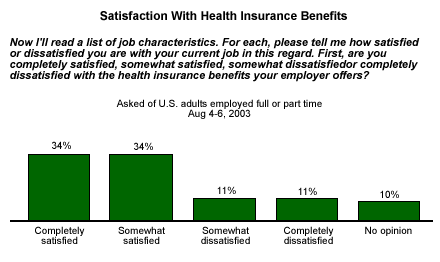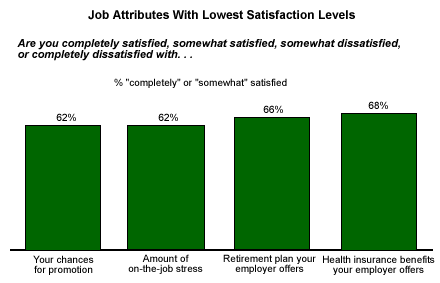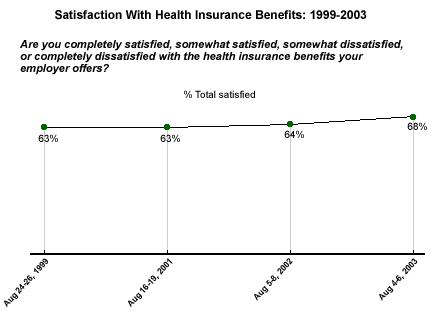High-profile grocery worker and transit worker strikes in California and other states have been largely centered on dissatisfaction with employee health benefits. But striking workers aren't the only ones thinking about health benefits this time of year. The fall is open-enrollment season -- a time when many employees renew their health insurance and their employers seek to control rising healthcare costs that increase employee premiums, deductibles, and co-pays.
Just how satisfied are American workers with their health insurance? Nearly 7 in 10 employed adults are "completely" (34%) or "somewhat" (34%) satisfied with the health insurance benefits their employers offer, according to an August 2003 Gallup Poll*. Only 22% of employed adults are dissatisfied with the offered benefits.

While 68% may sound like a high proportion of satisfied employees, it's actually low relative to ratings of other workplace conditions. On the list of 13 job satisfaction attributes that Gallup tested, only satisfaction with on-the-job stress and chances for promotion ranked lower than satisfaction with health insurance benefits. Satisfaction with company retirement plans placed similarly to health benefits.

This level of satisfaction with health insurance benefits has been relatively consistent since Gallup began asking the question in 1999. There has been a very slight increase in satisfaction when compared with the initial measurements.

Who Is Most Dissatisfied?
Age is clearly related to satisfaction with health insurance benefits. Forty-four percent of workers between the ages of 18 and 29 are satisfied, as are 32% of 30- to 49-year-old workers and 30% of workers aged 50 and older. Obviously, older workers are more likely to make use of their benefits, not only for spouses and children, but for their own age-related health problems.
Changes to Come?
The lack of change over the last few years in the level of worker satisfaction with health benefits that employers offer is somewhat surprising given rising costs. A 2003 survey by the Kaiser Family Foundation and Health Research Educational Trust shows that in each of the four years that Gallup asked this question, there were double-digit increases in premiums for families in employer-sponsored health plans. Satisfaction with benefits was stable in 2002 and 2003, despite the biggest increase in family healthcare costs since 1990. Aggregated Gallup data from 2000-2002** also show that over this period, 73% of Americans were dissatisfied with the nation's healthcare costs overall.
Given that fact, how can satisfaction with employer health benefits remain so high? One factor may be Americans' tendency to express a more favorable view of their own conditions than of nationwide circumstances -- a similar effect is seen for other institutions, such as public schools.
*Results are based on telephone interviews with 588 national adults who are employed full or part time, aged 18 and older, conducted Aug. 4-6, 2003. For results based on the total sample of national adults, one can say with 95% confidence that the margin of sampling error is ±4 percentage points.
**Results based on an aggregate of telephone interviews with 2,006 American adults, aged 18 and older, conducted from 2000 through 2002. For results based on the total sample, one can say with 95% confidence that the maximum margin of sampling error is ±2.4 percentage points.